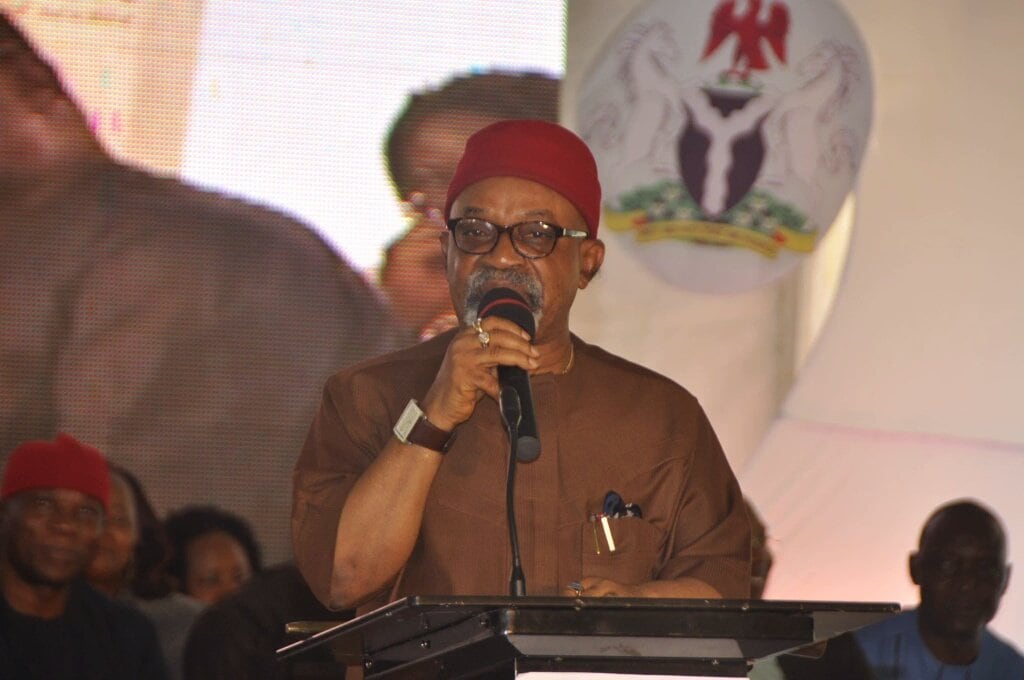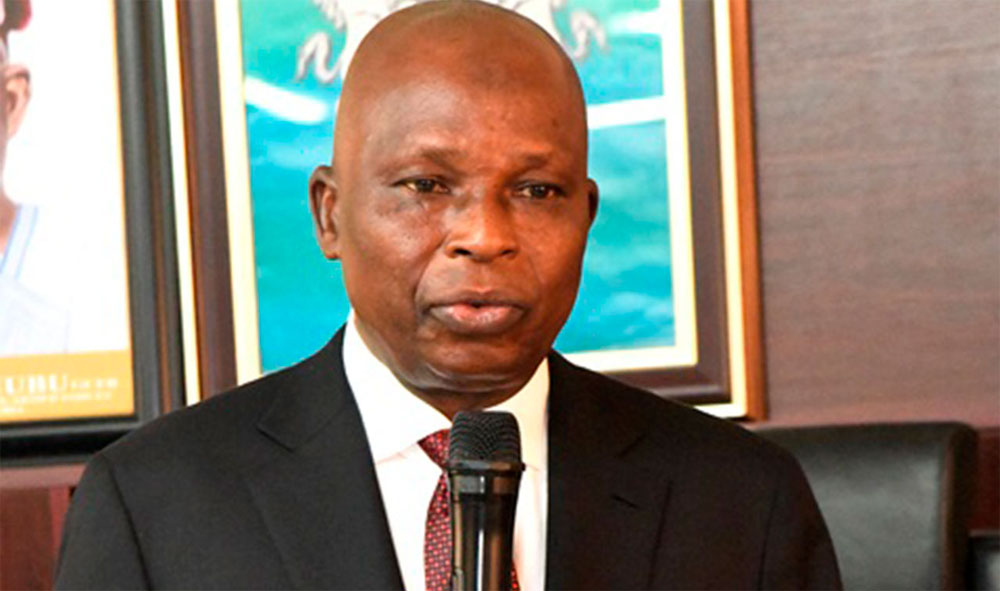“Now that the National Assembly is making a law to create additional states for the people of Southeast, it is reasonable, fair and timely to create additional local governments for Lagos State.”
News
FG explores private sector partnership to fund tertiary education

The Federal Government is exploring the option of private sector partnership to fund tertiary education, Minister of Labour and Employment, Dr Chris Ngige, has said.
Such arrangement has become a necessity in view of the current reality that the government cannot sustain the funding of the institutions alone, according to the minister.
Ngige gave this indication in an interview he granted Arise News Channel Sunday night.
He said in keeping with economic realities, the government had decided to seek alternative funding sources from the private sector to meet the requirements of public tertiary education.
He said, “The Federal Government alone cannot sustain the tertiary education or even the education system in Nigeria. Do not also forget that education is on the concurrent list,” he said.
The minister also faulted the funding options recommended by the Academic Staff Union of Universities, saying they were not implementable.
“We agreed with ASUU to put up a NEEDS assessment committee, which they are members. That committee has come up with suggestions on possible sources of funding the universities but when they were presented to government, they were found not to be implementable.”
Ngige said one of the recommended sources of funding universities, as recommended by ASUU, was the Value Added Tax (VAT) but explained that 85 per cent of the revenue would go to the states, leaving only 15 per cent for the Federal Government.
The minister said ASUU also suggested stamp duty proceeds should be used to fund the universities, adding that the proposal isn’t feasible as only the Federal Inland Revenue Service (FIRS) can collect stamp duty.
“So, these two funding sources suggested by ASUU could not be pushed through by the ministry. So, the NEEDS committee is now working on another validation of other sources, targeting the private sector,” he said.
He appealed to ASUU to accept the Federal Government’s offer and call off its eight-month industrial action.
Ngige said the Federal Government had met almost all the demands made by the union.
“I feel that even this offer is one of the best they have ever got since I started conciliation with them. I do not see why they should not accept it. Everything they asked for has been granted. I don’t think they should say the offer is not good.
“But I told them before they left that asking the nation and the students to wait from Friday to Friday is unfair; they should come back to us by Tuesday. They have done that before when we negotiated with the Senate president. The offer was made on a Thursday and they came back to us on a Tuesday.
“So, that’s what I expect them to do this time around. If they do so, the nation will appreciate them and regard them as patriotic citizens of the Federal Republic of Nigeria. I expect them to get back to me much earlier than Friday.”
Ngige explained that part of the proposals made to ASUU is that the Federal Government was ready to provide N40 billion for payment of earned allowances to all university workers and N25 billion as revitalisation fund to improve infrastructure.
He said government had asked ASUU as an alternative to accepting the provision of N35 billion as earned allowances and so as to raise the money for revitalisation fund to N30 billion.
The minister also said that the government had agreed to pay striking lecturers the withheld salaries for February to June.
He, however, added that the problem was how the payment would be done since the affected lecturers were not registered on the IPPIS.
Ngige said the government agreed that the lecturers be paid using the old method.
On the evaluation of the ASUU’s alternative payment platform, the University Transparency and Accountability Solution (UTAS), Ngige said the software was undergoing integrity test at the Nigeria Information Technology Development Agency (NITDA).
“I am not a scientist; I am not a guru. I will only rely on what experts in the Nigeria Information and Technology Development Agency tell me and the same way they will write to ASUU, the Federal Ministry of Education and the Accountant General of the Federation. We have an AGF who does not speak with the media and a minister of finance that is very busy with managing the country’s economy and talking to our creditors and bilateral partners. So, as a conciliator, it is me that will say what the situation is with government,” Ngige said.
News
Protest: Police combat ready, deploy 4,200 operatives to FCT strategic places

Protest: Police combat ready, deploy 4,200 operatives to FCT strategic places
The police say they are combat ready to crush any form of violence that may result from nationwide protests planned for next Thursday August 1 by some Nigerians against hardship and bad governance.
Indeed, starting with the Federal Capital Territory, Abuja, the police said it had deployed armed operatives to strategic locations.
The FCT Minister Nyesom Wike had earlier warned the organisers of the protest that Abuja would not be available for any rally or demonstration on August 1.
But a statement by Police Public Relations Officer, SP Josephine Adeh, in Abuja on Friday, said the FCT Command had deployed a total of 4,200 police officers to curb any form of violence that might arise from the protest.
The command was reacting in anticipation of the planned nationwide protest by some human rights activists and Nigerian youths, to publicly express their displeasure over hunger and hardship.
The planned protest has since generated massive traction on social media, especially on X.
According to Adeh, the command has proactively deployed material and human resources across the nooks and crannies of the nation’s capital.
The deployment, he said, was aimed at ensuring public safety, protecting protesters, and preventing protests from being hijacked by non-state actors.
The police command said the action was part of visibility policing, involving deployment of explosive ordinance devices (EOD) experts, and personnel at various strategic locations, raids on identified black spots, uncompleted buildings/shanties, stop and search, vehicular and foot patrol, and synergy with sister security agencies.
The Commissioner of Police FCT, Benneth Igweh, while acknowledging the right of residents to protest, advised that it should be peaceful.
He wrote, “The CP vows to resist all forms of violent protest and lawlessness, as the police will not be stampeded into allowing the destruction of public and private properties or loss of lives.
Residents are also advised to be vigilant and take advantage of the police emergency lines, to report suspicious activities through 08032003913, 08028940883, 08061581938, 07057337653 PCB: 09022222352, and CRU: 08107314192.
News
National Assembly urged to create more councils for Lagos

National Assembly urged to create more councils for Lagos
National Assembly has been urged to create more local governments for Lagos State, to meet its current population, social, economic and environmental challenges.
The Red Chamber is also advised to enact laws granting the state a special status for being the country’s commercial city and economic melting pot.
Renowned socio-political activist and critic, Chief Adesunbo Onitiri, made the demands in a statement in Lagos.
The activist recalled that in 1976 when the military government created states and local governments, Lagos and Kano states had 20 councils each.
“Later, Kano State councils increased to 44, while Lagos councils remained at 20. When the Abacha government carved out Jigawa State out of Kano State, Jigawa got 27 local governments, while Kano was still having 44 councils.
READ ALSO:
- Kano bakers summoned over bread price hike
- FG warns LG chairs misusing FAAC funds will face jail term
- PSG not giving up on Osimhen, seek further slash in price
“It is an injustice for Lagos State to remain with only 20 local governments till today, despite its gigantic social, security and economic problems,” Onitiri said.
He recalled that when the then Governor of Lagos State, now Nigeria’s President, Asiwaju Bola Ahmed Tinubu, created 37 additional councils in 1999, Chief Olusegun Obasanjo, then President, seized Lagos State federal allocations for two years.
He said Lagos State through the then Attorney-General, Prof. Yemi Osinbajo, sued the Federal Government, and the state government won the case against Federal Government at the Supreme Court.
He regretted that till now, National Assembly has not done the needful to enact a law to accommodate the 37 local governments created by Lagos State Government.
News
FG warns LG chairs misusing FAAC funds will face jail term

FG warns LG chairs misusing FAAC funds will face jail term
The Federal Government has threatened jail terms for Local Government Area chairmen who tamper with Federation Accounts Allocation Committee funds.
Lateef Fagbemi (SAN), the Attorney General of the Federation and Minister of Justice, made the announcement yesterday at the Human Rights Writers Association of Nigeria’s 17th annual lecture event in Abuja.
He stated that none of the chairmen have immunity and will be imprisoned if they tamper with funds designated for the development of their areas. Fagbemi stated, “We have a situation on our hands; I know that it is still there; the conduct of elections must be done by the states.”
“But the distinction is this: don’t forget, the governors have immunity, the local government council chairmen or councillors, they have no immunity, so they have to choose between dealing with the funds of the local government as they like and risking going to jail. The choice is theirs (LG chairmen).
“If they want to tamper with these funds and end up in jail, it is their choice. If they want to write their names in letters of gold, activities like construction or road upgrades must be returned to the local government. They don’t all have to come to Abuja.
READ ALSO:
- PSG not giving up on Osimhen, seek further slash in price
- Saudi duo to bid for Osimhen amid PSG stalled deal
- FG rolls out fresh plans to revive local manufacturing, create 4.4 million jobs
“If they stay at the local government, we will be able to reduce the level of insecurity that we have in Nigeria today. What obtains offshore is that the security agents are able to perform optimally because of information that comes to them from members of the public and usually it is from the grassroots.”
The minister said the federal government opted to use the supreme court to achieve local government autonomy due to the challenges it will face at state assemblies, stressing that any speaker who would have supported the cause will not survive the tenure or lose his reelection.
The Minister stated that for over two decades, local government administration in the country has been in comatose with state governments not remitting funds meant for the local governments.
Fagbemi, who urged security agents in the country to stop keeping suspects in detention beyond the period allowed by the constitution, added that detention without any court order will no longer be tolerated as appropriate sanctions will be applied to those found guilty of contravening the law of the land.
On his part, the National coordinator of HURIWA, Comrade Emmanuel Onwubiko, urged the federal government to cut down on the cost of governance.
He blamed corruption for the insecurity and high unemployment rate in the country, which is responsible for impending protests in the country.
FG warns LG chairs misusing FAAC funds will face jail term
-

 News2 days ago
News2 days agoNLC can’t withdraw from protest it didn’t organise – Ajaero
-

 News3 days ago
News3 days agoNorthern group attacks Reps Minority Caucus for demanding Nnamdi Kanu release
-

 News2 days ago
News2 days agoFG unveils training programme for 1,000 Nigerians in AI, blockchain
-

 News2 days ago
News2 days agoMinimum wage: Akpabio says domestic workers can’t earn less than N70,000
-

 International13 hours ago
International13 hours agoNetanyahu, Biden hold talks over tense Gaza ceasefire
-

 Africa3 days ago
Africa3 days agoDozens arrested in Uganda anti-government protests
-

 News3 days ago
News3 days agoDangote refinery: MAN cautions against demarketing local investments
-

 metro2 days ago
metro2 days agoWanted Lagos drug baron, Temo, arrested














You must be logged in to post a comment Login